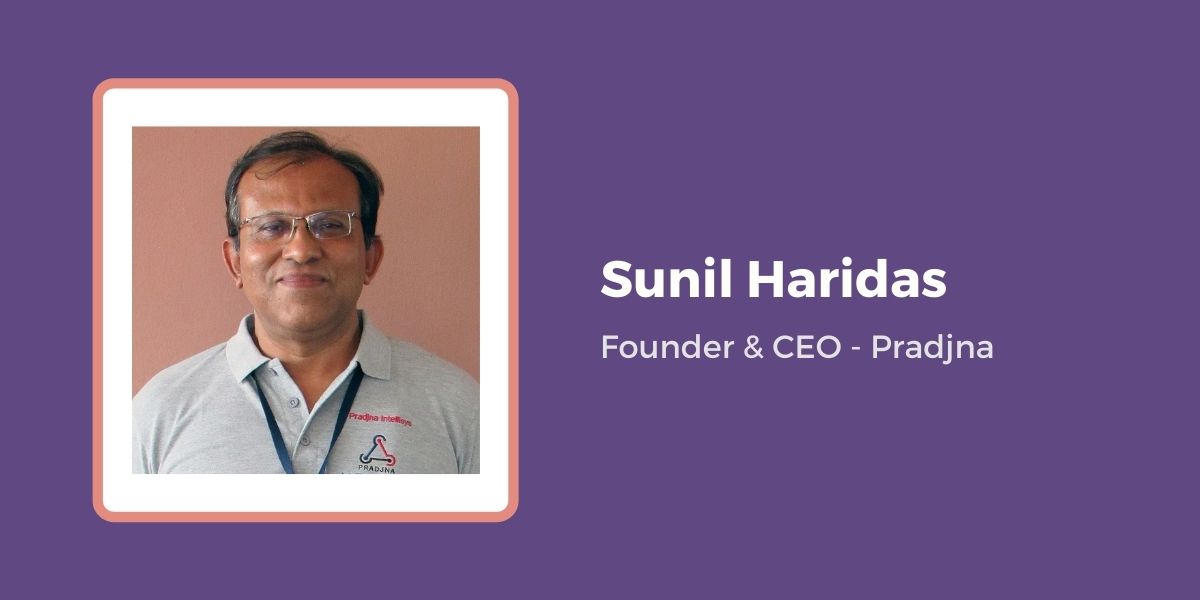The Machine Learning field is fascinating!
In the simplest terms, Machine learning is the branch of Artificial Intelligence focused on building computer algorithms that can improve automatically through experience and by the use of data.
With each passing day, the field is advancing with new findings and a way to grow further. According to Crunchbase, there are more than 4000 Machine Learning startups with the total funding amount reaching $63.4B.
In this brand story, we are covering one such startup Pradjna, that is using the power of Machine Learning in performance management solutions.
We will be diving deep into their story and how it became one of the leading skill assessment platforms in India. So, let us start with the introduction:
About Pradjna
Pradjna is a revolutionary platform to assess human blue-collar skills – driving, welding, industrial painting, machining – using a Machine Learning framework and Sensor Fusion – Android, iOS, IoT, OBD2 based front-end.
Currently, human skills/performance in the areas mentioned above are only assessed by human subject matter experts. This is not always feasible, objective, or cost-effective – eg: Associates of Taxi aggregator companies, customers of motor insurance companies – and in multiple other business use cases.
Pradjna provides a solution for this critical need to evaluate human behavior & skills that is objective, data-driven, distributed, scalable, cost-effective, and always available. Their solution is also easy to implement, use and maintain.
💡 Pradjna’s Mission and Vision: Pradjna is focused on leveraging technology to evaluate and improve human blue-collar performance Their vision is to build a common platform for blue-collar skill assessment in the manufacturing and services sector.
🏷️ Pradjna’s Tagline: Humans evaluate humans. But with Pradjna machines will evaluate humans.
About The Founders and Their Team
Sunil Haridas – Founder & CEO
Sunil Haridas is a senior technology leader with more than 25 years of expertise in Application and Product development. He is an ex Infosys, ex IBM with global delivery experience in the US, Australia, Thailand, and Singapore.
Sunil is a coordinator of the National Working Group on AI technology standardization. He is an engineer, MBA, and an alumnus of IIM Calcutta.
Vinod Balakrishnan – Co-Founder
Vinod Balakrishnan is a Mechanical engineer and entrepreneur based in Trivandrum. His area of expertise is the food processing industry.
He is an industry leader with more than 2 decades of experience and the secretary of KINFRA Apparel Park Entrepreneurs’ Association, Thiruvananthapuram. Vinod is also an accomplished golf player.
Ashish Jain – Strategy Consultant
Ashish Jain is a transformation expert in turning around business units or organizations and has turned around multiple “in-red” accounts/BU/businesses to bring them out from deficit of stakeholder trust, operating loss, or people dis-engaged culture.
Ashish is an entrepreneur at heart and keeps experimenting with business and technology models. He is the CEO at JSS STEP Incubator.
Prof. Ranjan Das – Advisor
Prof. Ranjan Das is on a mission to build The Strategy Academy as an institution that helps individuals and organizations take charge of their destiny, create wealth and achieve success in whatever field of activity they are in. Prof. Das is a senior professor of Strategy of IIM, Calcutta.
Pradjna’s Story and How It All Started
Sunil Haridas is an experienced technology professional with more than 25 years of experience. He has been in management positions in IBM, Infosys, Covansys and worked extensively in Account Management, Delivery Management roles in India, the US, Australia, Thailand, and Singapore.
Sunil has a keen interest in the skill development domain – white-collar as well as blue-collar segments. He has been involved in training and mentoring a large number of students and young professionals as part of his social enterprise Aspire Management Solutions, Thiruvananthapuram.
Aspire has trained more than 3000 professional students from the southern districts of Kerala.
This interest in skill assessment has evolved and was extended to Blue Collar skills where they felt that there is a greater opportunity for digital transformation using advanced technology like Machine Learning.
This also has a significant social impact as most Blue-collar workers come from less empowered segments and regions. Cofounder Vinod Balakrishnan is a mechanical engineer and has significant experience in operations specifically in the manufacturing segment.
Both Founder and Cofounder are personally acquainted for many years and have collaborated previously as well.
Major Challenges Faced During Their Initial Stage
The team faced challenges initially due to changes in the regulatory framework for the logistics segment which affected the way driver behavior data could be collected. The government has made it mandatory that all public utility vehicles need to use AIS-140 standard hardware devices.
Since their product was developed to use a software-based stack, they had to separately develop and integrate AIS -140 compliant hardware.
They have also faced major disruption in the past nearly 2 years due to the ongoing CoVID pandemic. This has delayed or postponed sales closure with the clients. Also, there are challenges around face-to-face meetings and product deployments with clients.
How The Platform Works?
Pradjna’s machine learning platform is unique as they use an Artificial General Intelligence framework. This framework is generic and more flexible than industry-leading deep learning networks.
These deep learning networks like Google Tensor Flow or IBM Watson, require a separate training mode with huge data sets to learn the specific context and to build internal logic. But in their case there is no separate training and testing mode, the same data stream is used to first learn and subsequently for anomaly detection.
This is clearly a unique advantage in many real-life situations like driving where each driving context is dissimilar to previous contexts. Also, Pradjna’s data stream is generic time series data which makes their system more adaptable.
Their framework closely follows the way the human neocortex works. It learns by building a neural network on the fly by strengthening and weakening the network learning nodes the same way a biological neural network quickly learns its context or environment without direct supervision.
For driving context, they have integrated global industry standards like OBD-2 and Indian national standard AIS-140. Their App-based solutions are available in Android and iOS.
Pradjna Driver Analyser (PDA): It is specifically designed to assess driver behavior from a risk, cost, and performance perspective. The product also includes features to identify risky behavior like drowsiness, extended use of phones while driving.
The company also provides features to identify accidents and notify pre-configured contacts including first responders, police, and/or relatives
They are currently developing Pradjna Welder Analyser (PWA) which would be their initial product for manufacturing the blue-collar segment. PWA offers solutions to evaluate the quality, productivity, safety, and performance of industrial welders using a Haptic-based senor suite and proprietary Machine Learning platform.
What Is Their Business Model?
Pradjna has a cloud-based B2B Enterprise solution that is based on a subscription model. Hence they are able to provide a cost-effective, highly scalable, secure, and always available solution to their corporate customers.
They can also offer solutions globally based on the cloud-based SaaS model. The company has got a significant target market in India and also globally.
For example, their offering in the motor insurance domain has the potential to reach a large percentage of 450 million vehicle owners (more specifically about 42 million 4 wheelers drivers) in India and a much bigger population globally through their enterprise customers who are the largest general insurance companies in each country.
Pradjna demonstrates how technology can be leveraged at the highest level of human capability – it is now possible that the Machine can judge better than the human!
They also have the opportunity to provide a cost-effective solution as they have the option of a purely software-based stack. This reduces the TCO (Total Cost of Ownership) for their customers by reducing the purchase price, price of installation and support, and cost of upgrades in the future.
Hence they are able to compete better in markets like India which are more price sensitive compared with more advanced countries.
How Does The Business Generate Revenue?
Their revenue model has three main options or streams:
Annuity Based: That is offering a fixed annual fee for a large customer like insurance companies. This would be irrespective of the number of end-users of the company using the product
Seat Based: This license offers to calculate the price based on the number of licenses used by the company. This is suitable for large logistics and fleet companies.
Premium Model: In this model, basic features are available for free subject to a ceiling on the number of users. Additional features or more usage beyond the ceiling are charged. This model is suitable for NGOs and small HR assessment companies to use or evaluate the product.
Pradjna’s Funding and Investors
- The company had initially started by bootstrapping its product development in 2018. Their Seed Funding of INR 2,500,000 from KSIDC was approved in June 2018 and disbursements were completed in one year based on their developmental milestones.
- The team continued their product and business development activities with their own funds in 2020 which was also impacted by the CoVID pandemic. Promoters contribution so far has been around INR 10,000,000.
- Towards the end of 2020, they completed another round of seed funding from Shell Ventures, the venture arm of Royal Dutch Shell, the Netherlands in India.
- They had also received a grant of INR. 700,000 under Tide 2.0 of MeitY, Government of India in Feb 2021
- Pradjna won the Third Prize in the international venture competition “Win The Future 2021” in Suzhou, China under the country segment. There the team received a grant of CNY 10,000 (INR 113,800) from the City Government of Suzhou as part of this award recently.
What Is Their Current Growth and Stats
The company has completed a number of pilot projects with some of the top corporates in India like Indian Oil Corporation, Adani Vizhinjam Port, Supplyco, Kerala, etc.
They are also working with Reliance Petroleum, Shell India to offer suitable solutions to them. Due to the ongoing CoVID situation, their revenue-generating projects got significantly delayed. Hence they are currently at a pre-revenue stage.
What Are Their Future Plans?
💡 Milestone 5: Series B funding. Seed Funding institutions have the exit option through third party acquisition of stake (T + 1460 days )
💡 Milestone 4: 1 million annual end-user assessments completed for the year ( T + 1280 days ). Presence in large markets in the US and EU
💡 Milestone 3: Pradjna V 2.0 major release with leading HRMS enterprise integration (T + 900 days ). Pradjna Painter Analyser (PPA) and Pradjna Machinist Analyser (PMA) are commercially available. Series A funding
💡 Milestone 2: Complete 50,000 annual end-user Blue Collar assessments (T + 540 days ). Commercial Release of Pradjna Welder Analyser (PWA). Pre-Series A funding
💡 Milestone 1: Pradjna V 1.2 release with initial B2B user customizations (T +180days ). Seed Funding funding – round 2 closure
* T is the Pradjna V 1.1 baseline release completed in September 2020
Pradjna’s Competitors
Pradjna Driver Analyser (PDA) has few competitors in the market. These include global competitors like:
Cambridge Mobile Analytics – a company specializing in the Behavior-based insurance segment and
Nissan Corporation – Nissan Connect is a solution offered in the connected car space which also provides some features to evaluate driver behavior. There are few start-up companies in India that offer solutions in this domain.
On the Pradjna Welder Analyser (PWA) and other Industry 4.0 solutions, they do not have direct competition at this stage. There are some companies like SkillVeri in India which offer Virtual Reality (VR) based training solutions to blue-collar skills like Welding and Painting.
But Pradjna’s product is focused on assessments/evaluations of employees and potential employees and not on skills training.



